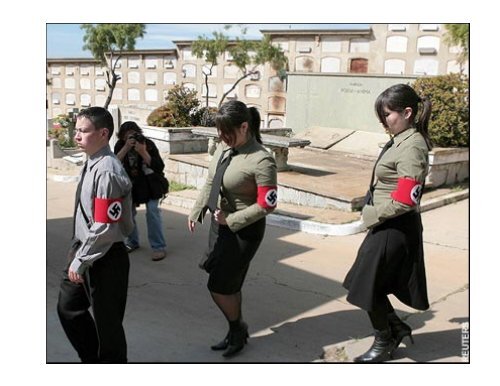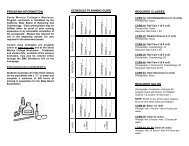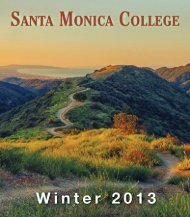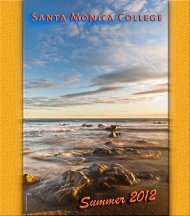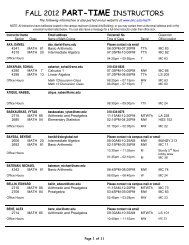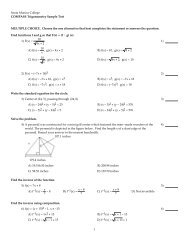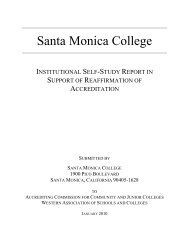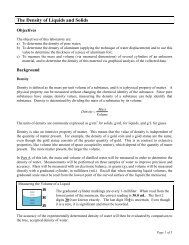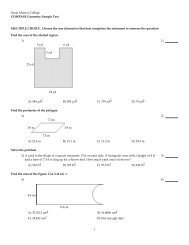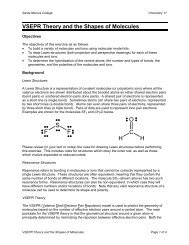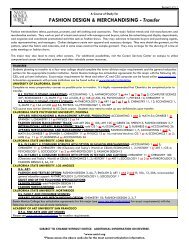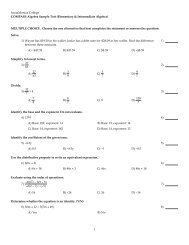Eau to Joy(ce): Modernism, Fascism, and James Joyce
Eau to Joy(ce): Modernism, Fascism, and James Joyce
Eau to Joy(ce): Modernism, Fascism, and James Joyce
Create successful ePaper yourself
Turn your PDF publications into a flip-book with our unique Google optimized e-Paper software.
<strong>Eau</strong> <strong>to</strong> <strong>Joy</strong>(<strong>ce</strong>): <strong>Modernism</strong>,<br />
<strong>Fascism</strong> <strong>and</strong> <strong>James</strong> <strong>Joy</strong><strong>ce</strong>.
“Germs Choi<strong>ce</strong>” (born 1882)
Adolf Hitler (born 1889)
<strong>James</strong><br />
<strong>Joy</strong><strong>ce</strong>:<br />
1882-<br />
1941
<strong>Joy</strong><strong>ce</strong>, Pound, Ford, Quinn
Ezra Pound in 1945
Wyndham<br />
Lewis:<br />
British<br />
Modernist<br />
.
Ezra Pound:<br />
American<br />
Modernist<br />
(Drawn by<br />
Wyndham<br />
Lewis)
Dublin. A city that produ<strong>ce</strong>s<br />
“paralysis” in its occupants.
Dubliners (1914)<br />
• “Irel<strong>and</strong> is an old sow that eats its young”<br />
• “Yes, the newspapers were right, snow<br />
was general all over Irel<strong>and</strong>.” (from The<br />
Dead)
S<strong>and</strong>ymount Str<strong>and</strong>: the<br />
Beach near Dublin, Irel<strong>and</strong>.<br />
(see ʻProteusʼ in Ulysses)
Proteus:<br />
• Boulders become mammoth skulls<br />
• Eyelashes become peacock feathers<br />
• Stephen becomes Hamlet<br />
• Irel<strong>and</strong> becomes Denmark<br />
• Hat becomes a loaf of bread<br />
• Teeth become shells<br />
• S<strong>and</strong> becomes dead languages<br />
• Seaweed becomes womenʼs hair<br />
• Frenchman become Spaniards<br />
• Womb becomes <strong>to</strong>mb<br />
• A dog becomes a leopard becomes Christ<br />
• Paris the city becomes Paris the man.<br />
• Stephen becomes Cassiopea<br />
• The chapter itself almost turns in<strong>to</strong> another chapter!
In Greek mythology, Proteus (_______) is an<br />
early sea-god, one of several deities whom<br />
Homer calls the "Old Man of the Sea" [1] , whose<br />
name suggests the "first", as pro<strong>to</strong>gonos<br />
( _________) is the "primordial" or the<br />
"firstborn". He can foretell the future, but, in a<br />
mytheme familiar from several cultures, will<br />
change his shape <strong>to</strong> avoid having <strong>to</strong>; he will<br />
answer only <strong>to</strong> someone who is capable of<br />
capturing him. From this feature of Proteus<br />
comes the adjective protean, with the general<br />
meaning of "versatile", "mutable", "capable of<br />
assuming many forms". "Protean" has positive<br />
connotations of flexibility, versatility <strong>and</strong><br />
adaptability.
• The <strong>ce</strong>ntral<br />
character/hero:<br />
Leopold Bloom,<br />
is an Irish Jew.<br />
Ulysses (1922)
Sir Edward<br />
Oswald<br />
Mosely: 6 th<br />
Baronet:<br />
1896-1980.<br />
Leader of the<br />
British Union<br />
of Fascists<br />
(<strong>and</strong> Member<br />
of Parliament)
Beni<strong>to</strong><br />
Mussolini:<br />
1883-1945
Adolph<br />
Hitler:<br />
1889-<br />
1945
“His<strong>to</strong>ry is a<br />
nightmare from<br />
which I am<br />
trying <strong>to</strong> awake.”<br />
–<br />
<strong>James</strong> <strong>Joy</strong><strong>ce</strong>
<strong>Fascism</strong> vs. <strong>Joy</strong><strong>ce</strong>ʼs <strong>Modernism</strong><br />
<strong>Fascism</strong><br />
• Uses myth <strong>to</strong> inspire<br />
images of purity <strong>and</strong><br />
nationalism<br />
• Faith in palingenesis<br />
• Appropriates Christian<br />
symbols <strong>and</strong> narratives:<br />
Fuhrer as Savior, Second<br />
Coming etc..<br />
• Time is linear, the Eternal<br />
Reich will be established<br />
• Nazi ideology is ʻNaturalʼ<br />
<strong>Joy</strong><strong>ce</strong><br />
• Uses myth <strong>to</strong> reveal how<br />
his<strong>to</strong>ry is always mixed, <strong>and</strong><br />
never pure.<br />
• No palingenesis, only the<br />
“same anew”: repetition of<br />
life<br />
• Rejects Christianity<br />
• Time is cyclical, no end:<br />
Vico<br />
• Nature, like language is<br />
anti-fascist, never pure,<br />
always slipping…
Mark Antliff: “<strong>Fascism</strong>, <strong>Modernism</strong> <strong>and</strong> Modernity”<br />
The Art Bulletin, March 2002: 148-69<br />
• “Too often fascismʼs cultural politics are<br />
cast in terms of a cynical manipulation of<br />
the docile masses, with no allowan<strong>ce</strong><br />
made for the appeal fascism had for the<br />
individual…Con<strong>ce</strong>pts of secular religion<br />
were , for the fascist believer, the agents<br />
for the spiritual uplifting <strong>and</strong> psychological<br />
conversion of individuals who could then<br />
experien<strong>ce</strong> fascismʼs redemptive value…”
A circular text:<br />
• The opening senten<strong>ce</strong>: “riverrun, past Eve<br />
<strong>and</strong> Adam's, from swerve of shore <strong>to</strong> bend<br />
of bay, brings us by a commodius vicus of<br />
recirculation back <strong>to</strong> Howth Castle <strong>and</strong><br />
Environs.<br />
• The last senten<strong>ce</strong>: “End here. Us then.<br />
Finn, again! Take. Bussoftlhee,<br />
mememormee! Till thousendsthee. Lps.<br />
The keys <strong>to</strong>. Given! A way a lone a last a<br />
loved a long the”
In the ballad, the hod-carrier Tim Finnegan, born "with a love<br />
for the liquor", falls from a ladder <strong>and</strong> is thought <strong>to</strong> be dead.<br />
The mourners at his wake become rowdy, <strong>and</strong> spill whiskey<br />
over Finnegan's corpse, causing him <strong>to</strong> come back <strong>to</strong> life <strong>and</strong><br />
join in in the <strong>ce</strong>lebrations. Whiskey causes both Finnegan's<br />
fall <strong>and</strong> his resurrection—whiskey is derived from the Irish<br />
phrase uis<strong>ce</strong> beatha meaning "water of life".<br />
"Finnegan's Wake" is famous for providing the basis of<br />
<strong>James</strong> <strong>Joy</strong><strong>ce</strong>'s final work, Finnegans Wake (1939), in which<br />
the comic resurrection of Tim Finnegan is employed as a<br />
symbol of the universal cycle of life. As whiskey, the "water of<br />
life", causes both Finnegan's death <strong>and</strong> resurrection in the<br />
ballad, so the word "wake" also represents both a passing<br />
(in<strong>to</strong> death) <strong>and</strong> a rising (from sleep).
HCE: Here Comes Everybody (or<br />
Haveth Childers Everywhere, or<br />
Humphrey Chimpden Earwicker<br />
etc…_)<br />
<strong>and</strong> his wife:<br />
ALP: Anna Livia<br />
Plurabelle
<strong>James</strong> <strong>and</strong><br />
Nora <strong>and</strong><br />
Giacomo <strong>and</strong><br />
Lucia
The River Liffey in Dublin : In Finnegans Wake this river<br />
is the ʻcharacterʼ ALP.
Metaphor: signifier = signifieds<br />
signifieds<br />
signifieds etc..<br />
e.g. Melvilleʼs white whale = ???(meaning<br />
is fluid)<br />
Me<strong>to</strong>nymy: signifier =signified<br />
e.g. “1801. I have just returned from a visit <strong>to</strong><br />
my l<strong>and</strong>lord…” (Emily Bronte)(the meaning is<br />
fixed)
O<br />
tell me all<br />
about Anna Livia! I want <strong>to</strong> hear all<br />
about Anna Livia. Well, you know Anna Livia? Yes, of course, we all<br />
know Anna Livia. Tell me all. Tell me now. You'll die when you hear.<br />
Well, you know, when the old cheb went futt <strong>and</strong> did what you know.<br />
Yes, I know, go on. Wash quit <strong>and</strong> don't be dabbling. Tuck up your<br />
sleeves <strong>and</strong> loosen your talktapes. And don't butt me -hike! -when you<br />
bend. Or what ever it was they threed <strong>to</strong> make out he thried <strong>to</strong> two in<br />
the Fiendish park. He's an awful old reppe. Look at the shirt of him !<br />
Look at the dirt of it! He has all my water black on me. And it steeping<br />
<strong>and</strong> stuping sin<strong>ce</strong> this time last wik. How many goes is it I wonder I<br />
washed it? I know by heart the pla<strong>ce</strong>s he likes <strong>to</strong> saale, duddurty devil!<br />
Scorching my h<strong>and</strong> <strong>and</strong> starving my famine <strong>to</strong> make his private linen<br />
public. Wallop it well with your battle <strong>and</strong> clean it. My wrists are wrusty<br />
rubbing the mouldaw stains. And the dneepers of wet <strong>and</strong> the<br />
gangres of sin in it! What was it he did a tail at all on Animal Sendai?<br />
And how long was he under loch <strong>and</strong> neagh? It was put in the newses<br />
what he did, nicies <strong>and</strong> priers, the King fier<strong>ce</strong>as Humphrey, with<br />
illysus distilling, exploits <strong>and</strong> all. But <strong>to</strong>ms will till. I know he well.<br />
Temp untamed will hist for no man. As you spring so shall you neap.<br />
O, the roughty old rappe! Minxing marrage <strong>and</strong> making loof.
Patrick A. McCarthy argues<br />
that "it is appropriate that<br />
the waters of the Liffey,<br />
representing Anna Livia,<br />
are washing away the<br />
eviden<strong>ce</strong> of Earwicker's<br />
sins as [the washerwomen<br />
speak, in chapter I.8] for<br />
(they tell us) she takes on<br />
her husb<strong>and</strong>'s guilt <strong>and</strong><br />
redeems him….”
•Puns in Finnegans Wake: The book is<br />
a “funferal” (a funeral <strong>and</strong> yet fun for<br />
all)<br />
•Title : Finnegans Wake = One manʼs<br />
funeral (an Irish wake is a funeral/party)<br />
or the waking up of all Finnegans/all<br />
peoples.<br />
• It is a “nightynovel” , a “book of the<br />
dark” in which we are all lost like “Alas<br />
in Jumbol<strong>and</strong>” <strong>and</strong> where all we can do<br />
is open our ears <strong>and</strong> “lissen.”<br />
•Puns ask us <strong>to</strong> consider “two thinks at<br />
a time”
• “it is not a novel that is about something it<br />
is that something” - Margot Norris
Some examples of “punns <strong>and</strong> reedles” from<br />
Finnegans Wake<br />
• The book is a “crossmess parzel” of<br />
“youlldied greedings”<br />
• Jacob <strong>and</strong> Esau are “Jerkoff <strong>and</strong> Eatsoup”<br />
• The book is not scripture but “scripchewer”<br />
• Was HCE caught putting his “pennis in the<br />
sluts maschine”?<br />
• In the beginning was the “whirred”<br />
• “Gricks may rise <strong>and</strong> Troysirs fall”<br />
• “Maria, full of grease, the load is with me…”
• Unlike the Fascist/Christian<br />
search for origins/purity/ or ʼthe<br />
Wordʼ <strong>Joy</strong><strong>ce</strong>ʼs text makes it clear<br />
that there is no origin, there is no<br />
root, other than the “whome of<br />
your eternal geomater” : Nature.<br />
Your Earth Mother. And she is<br />
endless, fluid, mixed <strong>and</strong> eternally<br />
returning <strong>and</strong> changing like a<br />
“collideorescape” because in the<br />
beginning was the “whirred.”
“In the name of<br />
Annah the<br />
Allmaziful,<br />
the Everliving,<br />
the Bringer of<br />
Plurabilities,<br />
haloed be her eve,<br />
her singtime sung,<br />
her rill be run,<br />
unhemmed<br />
as it is uneven!”<br />
--<br />
Finnegans Wake


